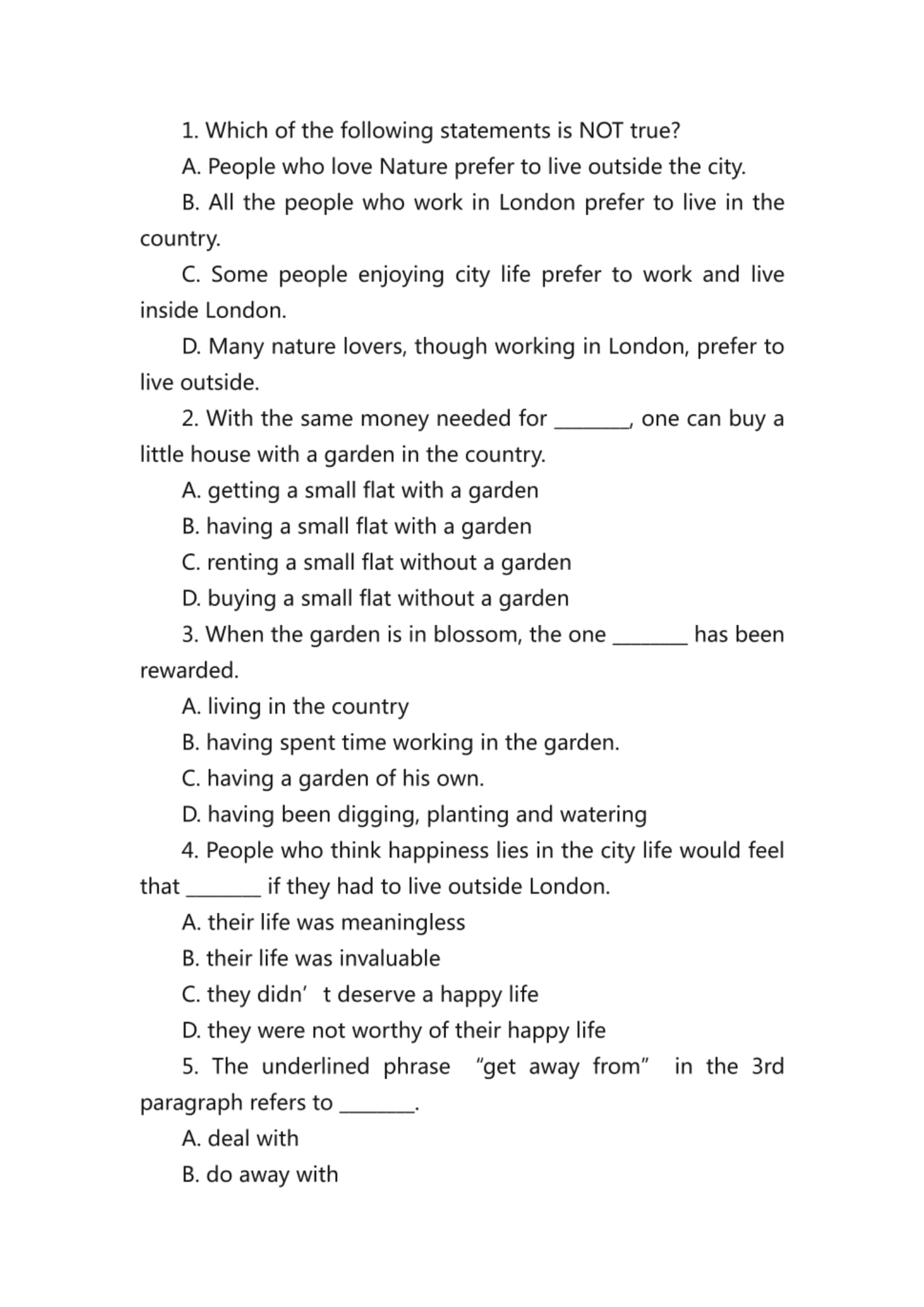




版權(quán)說明:本文檔由用戶提供并上傳,收益歸屬內(nèi)容提供方,若內(nèi)容存在侵權(quán),請進行舉報或認領(lǐng)
文檔簡介
大學(xué)英語閱讀理解練習(xí)題及答案
Passage1
ManypeoplewhoworkinLondonprefertoliveoutsideit,
andtogointotheirofficesorschoolseverydaybytrain,caror
bus,eventhoughthismeanstheyhavetogetupearlyinthe
morningandreachhomelateintheevening.
OneadvantageoflivingoutsideLondonisthathousesare
cheaper.EvenasmallflatinLondonwithoutagardencostsquite
alottorent.Withthesamemoney,onecangetalittlehousein
thecountrywithagardenofone'sown.
Then,inthecountryonecanreallygetawayfromthenoise
andhurryofbusyworkinglives.Eventhoughonehastogetup
earlierandspendmoretimeintrainsorbuses,onecansleep
betteratnightandduringweekendsandonsummerevenings,
onecanenjoythefresh,cleanairofthecountry.Ifonelikes
garden,onecanspendone'sfreetimedigging,planting,
wateringanddoingthehundredandoneotherjobswhichare
neededinagarden.Then,whentheflowersandvegetablescome
up,onehasgottherewardtogetherwiththosewhohaveshared
thesecretofNature.
Somepeople,however,takenointerestincountrythings:for
them,happinessliesinthetown,withitscinemasandtheatres,
beautifulshopsandbusystreets,dance-hallsandrestaurants.
Suchpeoplewouldfeelthattheirlifewasnotworthlivingifthey
hadtoliveitoutsideLondon.Anoccasionalwalkinoneofthe
parksandafortnight,s(twoweeks)visittotheseaevery
summerisallthecountrytheywant:theresttheyarequite
preparedtoleavetothosewhoaregladtogetawayfromLondon
everynight.
1.WhichofthefollowingstatementsisNOTtrue?
A.PeoplewholoveNatureprefertoliveoutsidethecity.
B.AllthepeoplewhoworkinLondonprefertoliveinthe
country.
C.Somepeopleenjoyingcitylifeprefertoworkandlive
insideLondon.
D.Manynaturelovers,thoughworkinginLondon,preferto
liveoutside.
2.Withthesamemoneyneededfor,onecanbuya
littlehousewithagardeninthecountry.
A.gettingasmallflatwithagarden
B.havingasmallflatwithagarden
C.rentingasmallflatwithoutagarden
D.buyingasmallflatwithoutagarden
3.Whenthegardenisinblossom,theonehasbeen
rewarded.
A.livinginthecountry
B.havingspenttimeworkinginthegarden.
C.havingagardenofhisown.
D.havingbeendigging,plantingandwatering
4.Peoplewhothinkhappinessliesinthecitylifewouldfeel
thatiftheyhadtoliveoutsideLondon.
A.theirlifewasmeaningless
B.theirlifewasinvaluable
C.theydidn'tdeserveahappylife
D.theywerenotworthyoftheirhappylife
5.Theunderlinedphrase“getawayfrom"inthe3rd
paragraphrefersto.
A.dealwith
B.doawaywith
C.escapefrom
D.preventfrom
很多在倫敦工作的人喜歡住在倫敦郊外,然后每天乘火車、汽車
和公交車去上班或上學(xué)。
這也就意味著他們不得不早出晚歸。
住在倫敦郊外的一個好處就是房子便宜。在倫敦即使是沒有花園
的小公寓也需要一等不菲的租金,用同樣的錢,你可以在郊區(qū)買一個
帶花園的小房子了
然后,他在鄉(xiāng)村就可以遠離喧囂和忙碌的工作生活。即使他不得
不起得更早,花更多的時間乘火車或公交車,但他晚上可以睡得更好。
在周末和夏季的夜晚,他可以享受鄉(xiāng)村清新干凈的空氣。要是他喜歡
花園,在花園里干一些想挖土、種植、澆水等許多園藝的活,那么當(dāng)
鮮花和蔬菜生長起來的時候,他就與其他分享大自然秘密的人們一樣
得到獎賞。
然而有些人對鄉(xiāng)村并不感興趣。對他們來說,幸福就在市區(qū)里,
那里有電影院、劇院、漂亮的商店、繁忙的街道、舞廳和飯店。如果
不得不住在倫敦郊外的話,這些人就覺得生活沒意義了。(對于那些
熱爰都市牛活的人來說)他們所需要的鄉(xiāng)村牛活,就是偶爾夫公園散
步,每個夏天去海邊過上兩個星期,其他跟鄉(xiāng)村有關(guān)的東西,讓那些
每天晚上都急于離開倫敦的人們(住在郊外的人們)去享受吧。
【答案與解析】本文介紹在倫敦工作的人對是在市里居住還是在
鄉(xiāng)下居住所持的不同看法和態(tài)度。
1.B。推斷題。根據(jù)文章內(nèi)容:雖然有很多喜歡鄉(xiāng)村生活,但文章
最后講也有些人喜歡城市生活,從而可推知此題答案為B。
2.C。細節(jié)題。根據(jù)文章第2段第二、三句可推知此題答案為C。
推斷題。根據(jù)文章第段最后兩句可知:要是他喜歡花園,
3.Bo3
在花園里挖土、種植、澆水等等,那么當(dāng)鮮花和蔬菜生長起來的時候,
他就得到了與大自然分享秘密的獎賞,所以選B。
4.A。推斷題。根據(jù)文章最后一段第2句Suchpeoplewould能el
thattheirlifewasnotworthlivingiftheyhadtoliveitoutside
PrincessDiana.
1.Thepassagemainlydealswith.
A.lifeanddeath
B.heroesandheroines
C.heroesandicons
D.iconsandcelebrities
2.Heroesandheroinesareusually.
A.courageous
B.goodexamplestofollow
C.self-sacrificing
D.alloftheabove
3.Whichofthefollowingstatementsiswrong?
A.PovertyinAmericahasbeeneasedwiththeeconomic
growth
B.Superstarsarefamousforbeingfamous
C.One'slookcancontributetobeingfamous
D.Heroesandheroinescanonlyemergeinwartimes
4.BeautifulyoungDianaSpencerfoundhergenuinelove
A.whenshewas19
B.whenshebecameaprincess
C.justbeforeherdeath
D.aftershegavebirthtoaprince
5.Whatismorelikelytosetanicon'sstatus?
A.Goodlooks.
B.Tragicandearlydeath.
C.Personalattraction.
D.Thequalityofone;sstory.
就定義而言,英雄之所以與眾不同是因為他們有非凡的勇氣、取
得了卓著的成就、常常為他人的利益而做出犧牲——他們是我們評價
別人的標(biāo)準(zhǔn)。他們是大家公認的對我們國家意識的形成和我們國家的
發(fā)展,還有對他們的崇拜者的一生起了重大作用的人。可是,有人說,
我們的時代是很難出現(xiàn)真正英雄的時代,英雄主義這一概念本身我們
就難以理解——它已經(jīng)成為歷史。有些人堅持說,由于冷戰(zhàn)的結(jié)束和
美國對外的和睦,我們的時代本質(zhì)上不是一個英勇豪壯的時代。更進
一步地說,總體犯罪率正在降低,經(jīng)濟的發(fā)展與增長已經(jīng)緩解了貧困,
醫(yī)療科學(xué)也在不斷的進步。
給文化偶像下定義就更難了,但是我們看到他們就認識了他們。
他們超越了名流,成為傳奇式人物,甚至在某種程度上已是神話式的
人物。但究竟是哪些因素使有些人成為偶像,另一些人僅成了名流呢?
這就太難說了。部分原因是他們的生平帶有傳奇故事的色彩。比如說,
年輕貌美的戴安娜?史賓塞,19歲時嫁給了王子,放棄了婚姻與王權(quán),
卻在找到真愛的那一刻死去了。漂亮的長相當(dāng)然有用,另外,在媒體
的炒作下某種難以描述的、特殊的個人魅力也起作用。然而悲劇性地
過早離開這個世界,卻是造成偶像最重要的因素——例如:小馬丁?路
德?金、約翰干?肯尼迪和戴安娜。
Passage3
Shynessisthecauseofmuchunhappinessforagreatmany
people.Shypeopleareanxiousandself-conscious;thatis,they
areexcessivelyconcernedwiththeirwonappearanceandactions.
Worrisomethoughtsareconstantlyoccurringintheirminds:
whatkindofimpressionamImaking?Dothey「keme?DoI
soundstupid?AmIwearingunattractiveclothes?
Itisobviousthatsuchuncomfortablefeelingsmust
negativelyaffectpeople.
Aperson7sconceptionofhimselforherseIfisreflectedin
thewayheorshebehaves,andthewayapersonbehavesaffects
otherpeople'sreactions.Ingeneral,thewaypeoplethinkabout
themselveshasaprofoundeffectonallareasoftheirlives/Shy
people,havinglowself-esteem,arelikelytobepassiveandeasily
influencedbyothers.Theyneedreassurancethattheyaredoing
"therightthing?Shypeopleareverysensitivetocriticism;they
feelitconfirmstheirfeelingsofinferiority.Theyalsofindit
difficulttobepleasedbycomplimentwithastatementlikethis
one,"You7rejustsayingthattomakemefeelgood.Iknowit's
nottrue."Itisclearthatwhileself-awarenessisahealthyquality,
overdoingitisharmful.
Canshynessbecompletelyeliminated,oratleastreduced?
Fortunately,peoplecanovercomeshynesswithdeterminedand
patienteffortsinbuildingself-confidence.Sinceshynessgoes
handinhandwithalackofself-esteem,itisimportantforpeople
toaccepttheirweaknessesaswellastheirstrengths.
Eachoneofusisaunique;worthwhileindividual,interested
inourownpersonalways.Thebetterweunderstandourselves,
theeasieritbecomestoliveuptoourfullpotential.Let'snot
allowshynesstoblockourchancesforarichandfulfillinglife.
1.Whatdoestheauthortrytoprovebyciting〃whatkind
ofimpressionamImaking?"
A.Shypeoplebenefitfromtheircaringabouttheir
appearance.
B.People'sshynessmadethemcaretoomuchabouttheir
appearanceandactions.
C.It'snaturalthatshypeopledon'tbelieveother7s
compliments.
D.Shypeoplethinktheyaredifferentfromothers.
2.Accordingtothewriter,self-awarenessis.
A.agoodquality
B.thecauseofunhappiness
C.harmfultopeople
D.aweakpointofshypeople
3.Whenbeingpraised,shypeoplefeelthatitis.
A.good
B.unreal
C.veryreasonable
D.harmful
4.Whichofthefollowingstatementsistrueaccordingtothe
passage?
A.Shynesshelpsustodevelopourpotential
B.Shynessenablesustounderstandourselvesbetter
C.Shynesscanblockourchancesforarichlife
D.Shynesshasnothingtodowithlackofself-esteem
5.Itcanbeinferredfromthepassagethatshypeople.
A.shouldfindmoreoftheirweakness
B.shouldunderstandthemselvesintherightway
C.hadbetterignoretheirweakness
D.cangetridoftheirshynesswhilemaintaininglowself-
esteem
參考譯文:
害羞是由于在眾人面前感覺不自在而引發(fā)的。害羞的人容易焦慮,
自我意識強,他們過分在意自己的外表和行為。他們頭腦里常有這樣
不安的想法:我給別人留下了怎樣的印象?別人喜歡我嗎?我是否聽
起來很蠢?我穿的衣服難看嗎?
顯而易見,這些不適的感覺對人有負面影響。一個人的自我認識
體現(xiàn)在他/她的言行舉止上,這些行為影響著他人對此作出反映。總體
來說,人們對自身的看法深刻影響到他們生活的方方面面。
害羞的人往往自信不足,常常被動,易受他人影響。他們需要有
相信自己的心態(tài),認識到自己所做的是正確的。害羞的人對批評意見
比較敏感。他們感到自卑意識由此增強。害羞的人難以取悅。他們會
說這樣的話:〃你說那些是讓我高興,其實我知道我沒那么好。〃顯
然,自我意識是一種良好的品質(zhì),過份的自我意識就不好了。
害羞能夠消除或至少減輕嗎?當(dāng)然。只要人們堅定耐心地培養(yǎng)自
信就可克服害羞。既然害羞源自缺乏自信,人們應(yīng)該在看到自己長處
的同時認識自己的短處。
每個人都是獨特的,有價值的個體,有自己的行為方式。我們對
自己了解越多,我們就越能發(fā)揮自己的潛能。不要讓害羞妨礙我們享
受豐富的人生。
1.一段第一二句話提到〃害羞的人很緊張和敏感,他們對于自己
的外表和行為過分關(guān)心。"所以選B為正確答案。
2.[答案]A。[解析]細節(jié)推斷題。根據(jù)第三段最后一句,可知自我
意識是一種好的品質(zhì),所以選選項有干擾性,過度的自我意識
AoC
是有害的,而不是說自我意識是有害的。3.[答案]B。[解析]細節(jié)推斷
題。根據(jù)第三段第五句。
4.[答案]C。[解析]細節(jié)推斷題。根據(jù)文中最后一句〃我們不應(yīng)該
讓害羞阻礙我們過豐富的有價值的生活。〃可知正確答案是
Co
5.[答案]B。[解析]細節(jié)推斷題。第五段第二句話提到,〃我們
越了解自己就越越容易發(fā)揮自己的潛質(zhì)。〃可以推斷出我們應(yīng)該正確
了解自己,所以選B。
Passage4
Whatmakesapersonascientist?Doeshehavewaysortools
oflearningthataredifferentfromthoseofothers?Theansweris
〃no”.Itisnotthetoolsascientistusesbuthowheusesthese
toolsthatmakeshimascientist.Youwillprobablyagreethat
knowinghowtouseapowerisimportanttoacarpenter.Youwill
probablyagree,too,thatknowinghowtoinvestigate,howto
discoverinformation,isimportanttoeveryone.Thescientist,
however,goesonestepfurther,hemustbesurethathehasa
reasonableanswertohisquestionsandthathisanswercanbe
confirmedbyotherpersons.Healsoworkstofittheanswershe
getstomanyquestionsintoalargesetofideasabouthowthe
worldworks.
Thescientist/sknowledgemustbeexact.Thereisnoroom
forhalfrightorrightjusthalfthetime.Hemustbeasnearlyright
astheconditionspermit.Whatworksunderonesetofconditions
atonetimemustworkunderthesameconditionsatothertimes.
Iftheconditionsaredifferent,anychangesthescientistobserves
inademonstrationmustbeexplainedbythechangesinthe
conditions.Thisisonereasonthatinvestigationsareimportant
inscience.AlbertEinstein,whodevelopedthetheoryofrelativity,
arrivedatthistheorythroughmathematics.Theaccuracyofhis
mathematicswaslatertestedthroughinvestigations.Einstein7s
ideaswereshowntobecorrect.Ascientistusesmanytoolsfor
measurements.Thenthemeasurementsareusedtomake
mathematicalcalculationsthatmaytesthisinvestigations.
1.Whatmakesascientistaccordingtothepassage?
A.Thetoolsheuses.
B.Thewayheuseshistools.
C.Hiswaysoflearning.
D.Thevarioustoolsheuses.
2.“Thescientisthowever,goesonestepfurther../.The
authorsaysthistoshow.
A.theimportanceofinformation
B.theimportanceofthinking
C.thedifferencebetweenscientistsandordinarypeople
D.thedifferencebetweencarpentersandpeoplewithother
jobs
3.Asoundscientifictheoryshouldbeonethat.
A.worksnotonlyunderonesetofconditionsatonetime,
butalsounderthesameconditionsatothertimes
B.doesnotallowanychangesevenunderdifferent
conditions
C.canbeusedformanypurposes
D.leavenoroomforimprovement
4.TheauthorquotesthecaseofAlbertEinsteintoillustrate
A.themeasurementsarekeystosuccessinscience
B.thataccuracyofmathematics
C.thattheinvestigationsareimportantinscience
D.thatthemathematicalcalculationsmaytesthis
investigations
5.Whatisthemainideaofthepassage?
A.Thetheoryofrelativity.
B.Exactnessisthecoreofscience.
C.Scientistsaredifferentfromordinarypeople.
D.Exactnessandwaysofusingtoolsarethekeystothe
makingofascientist.
是什么使一個普通人成為科學(xué)家?他有與從不同的學(xué)習(xí)方法和工
具嗎?答案是否定的。不是因為科學(xué)家使用的工具,而是因為他使用
工具的方法使他成為科學(xué)家。你也許認同怎么用力對一名木匠來說很
重要。你也許也認同怎么研究調(diào)查,發(fā)現(xiàn)信息對每個人來說都很重要。
然而,科學(xué)家比這更進一步,他必須確定他對自己的問題得出了一個
合理的答案,并且他的答案通過別人也可以得到證實。他同時把自己
得出的許多答案歸結(jié)為一個系統(tǒng)的關(guān)于世界如何運作的觀點。
科學(xué)家的知識必須很確切。不能給半錯半對或者只有一半機會對
的情況留任何空間。他必須在條件允許的情況下盡可能正確。在一種
條件下成功一次的話必須在同樣的條件下都能成功。如果條件不同,
科學(xué)家在證明過程中觀察到的任何變化都必須解釋他的條件是如何變
化的。這是關(guān)于調(diào)查研究在科學(xué)研究中十分重要的其中一個理由。爰
因斯坦通過數(shù)學(xué)方法提出了相對論。他的數(shù)學(xué)運用的正確性被后人通
過調(diào)查研究的方法證實該理論是正確的。一個科學(xué)家會用很多工具來
測量。測量的結(jié)果用來進行數(shù)學(xué)計算,再進行調(diào)查研究的測試。
Acitymanwasonholidayinthemountains.Hetalkedwith
amountainmanandfoundthatthemanwasstupid.Sohe
suggestedtheyplayagame.〃We'llaskeachotherquestions,n
hesaid,“andthepersonwillpayadollarifhecan'tanswerone
question?Themountainmanthoughtaboutthisforafew
minutes,thensaidthatthecitymanpaidadollarandhepaid
only50cents.Thecitymanagreed.
“Whathasthreelegsandcanfly?”askedthemountain
man.Thecitymanthoughtawhile,thenanswered"Idon'tknow.
Hereisyourdollar/
Thenheaskedthesamequestion:"Whathasthreelegsand
canfly?"don'tknow,either/saidthemountainman."Here
isyour50cents/
1.Acitymanwasonholiday.
A.inafarawayplace
B.onthehighhills
C.inacity
D.inavillage
2.Thecitymanfoundthemountainmanwas.
A.notclever
B.onthehighhills
C.clever
D.strong
3.Thedtymansaid,"We'll"
A.fighteachother
B.helpeachother
C.askeachotherquestions
D.lookateachother
4.Themountainman.
A.knewtheanswerhimself
B.didn'tknowtheanswerhimself
C.toldtheanswertothecityman
D.didn'twanttotellthecitymantheanswer
5.Atlast.
A.thecitymangotonedollar
B.thecitymangot50cents
C.themountainmangotonedollar
D.themountainmangot50cents
Lookattheinstructionsonthebottleofthemedicineand
thenchoosetherightanswers.
Johnistwelveyearsold.Hehadabadcoldandcoughedday
andnight.Hewenttoseeadoctor.Thedoctorgavehimsome
coughmedicine.
CoughMedicine
Shake(搖動)itwellbeforeuse.
Takeitthreetimeseachdaybeforemeals.
Dose(藥量):
Age:over142teaspoonfuls(勺)
8一131teaspoonful
4一71/2teaspoonful
Notrightforchildrenbelowtheageofthree.Putitinacold
place.UseitbeforeDecember1st2002.
1.Johnshouldtakeaday.
A.2teaspoonfuls
B.3teaspoonfuls
C.4teaspoonfuls
D.
1teaspoonful
2.Themedicineshouldbekeptin.
A.afridge
B.hotwater
C.anyplace
D.thesun
3.Johnshouldbeforehetakesit.
A.shakethemedicinewell
B.eatnothing
C.dosomeexercise
D.drinkacupoftea
4.Whenpeopleareyearsold,theycannottakethis
medicine.
A.eighty
B.thirty
C.two
D.twelve
5.Johnwillthemedicinewhenitisleftafter,2002.
A.throwaway
B.stoptotake
C.takeonce
D.takesixtimesmore
【答案與解析】約翰病了,咳嗽得很厲害。醫(yī)生給他開了些藥。
咳嗽藥上說明書的內(nèi)容主要包括了藥品的服用方法、藥量、貯存條件
以及保質(zhì)期等。
根據(jù)和
1.Bo"Johnistwelveyearsold."“8—131
teaspoonful”可知B為正確答案。
;是本題答案的依據(jù)。
2.AoTutitinacoldplace
答案就在(搖動)中。
3.Ao"Shakeitwellbeforeuse.“
由這
4.Co“Notrightforchildrenbelowtheageofthree”
句話可知,此藥不適用于三歲以下的兒童。
5.A。本說明的最后一句說的是此藥品的保質(zhì)期。答案顯然為A。
InEngland,peopleoftentalkabouttheweatherbecause
theycanexperiencefourseasonsinoneday.Inthemorningthe
weatheriswarmjustlikespring.Anhourlaterblackcloudscome
andthenitrainhard.Theweathergetsalittlecold.Inthelate
afternoontheskywillbesunny,thesunwillbegintoshine,and
itwillbesummeratthistimeofaday.
InEngland,peoplecanalsohavesummer.Soinwinterthey
canswimsometimes,andinsummersometimestheyshouldtake
warmclothes.
WhenyougotoEngland,youwillseethatsomeEnglish
peopleusuallytakeanumbrellaoraraincoatwiththeminthe
sunnymorning,butyoushouldnotlaughatthem.
Ifyoudonzttakeanumbrellaoraraincoatyouwillregret
laterintheday.
1.WhydopeopleinEnglandoftentalkabouttheweather?
A.Becausetheymayhavefourseasonsinoneday.
B.Becausetheyoftenhaveverygoodweather.
C.Becausetheweatheriswarmjustlikeinspring.
D.Becausetheskyissunnyallday.
2.Fromthestoryweknowthatcomeandthenthere
isaheavyrain.
A.sunshineandsnow
B.blackclouds
C.summerandwinter
D.springandautumn
n
3.Peoplecanalsohavesummerinwinter"means"Itis
sometimesinwinter/
A.warm
B.cool
C.cold
D.rainy
4.InthesunnymorningsomeEnglishpeopleusuallytakea
raincoatoranumbrellawiththembecause.
A.theirfriendsaskthemtodoso.
B.itoftenrainsinEngland
C.theyaregoingtosellthem
D.theyaretheirfavoritethings
5.Thebesttitleforthispassageis.
A.BadSeason
B.SummerorWinter
C.TheWeatherinEngland
D.StrangeEnglishPeople
Long,longagotherewasnozero.Towritethenumbersixty-
threepeoplewrote63.Towritesixhundredandthree,people
wrote63.Thespacebetweensixandthreewastheretomean."
notany"tens.Sometimespeopledidnotrememberthespace.It
washardtoseeandread.
Laterpeopleusedadottoholdthespace.Sixhundredand
threelookedlikethis.Butthedotwashardtosee.Sopeopleput
acirclearounditlikethis6o3.Thenpeoplecouldseethedot.
Theyrememberedthespace.Atlast,onlythecirclearoundthe
dotwasused.Itwaslikeazero.Thisisonestoryofhowthezero
cametobeused.
Nowzerohasmanyimportantuses.Zerotellshowmany.Can
youtellsomeotherwaysofusingzero?
1.Long,Iongagopeopledidn'tknowhowto.
A.write
B.writezero
C.writenumbers
D.writesixty-three
2.Long,longagoiftheywrotetwohundred-eight,people
wrote.
A.28
B.28
C.228
D.208
3.Laterwasusedtomeanspace.
A."notany"
B.letter"0"
C.zero
D.adot
4.Peopleusedcircles.
A.torememberways
B.toremembernumbers
C.nottoforgetthespace
D.tomeannothing
5.Thestorytellsus.
A.howzerocametobeused
B.howtowritezero
C.what'stheuseofzero
D.thatzeromeansadot,acircleorspace
IoftendreamedaboutPisawhenIwasaboy.Ireadabout
thefamousbuildingcalledtheLeaningTowerofPisa.ButwhenI
readthewordPisa,Iwasthinkingofpizza.1thoughtthistower
wasaplacetobuypizza.Itmustbethebestplacetobuypizza
intheworld,Ithought.
ManyyearslaterfinallysawtheLeaningTower.Iknewthen
thatiswasPisaandnopizza.Buttherewasstillsomethingspecial
aboutitforme.Thetowergotitsnamebecauseitreallydoes
leantooneside.Somepeoplewanttotrytofixit.Theyareafraid
itmayfalloverandtheydonztlikethatitleansoverthecity.
Idonotthinkit'sagoodideatotrytofixit.Thetower
probablywillnotfalldown,itis600yearsold.Whyshould
anythinghappentoitnow?And,ifyouaskme,Ilikewhatitlooks
like.Tomeitisaveryhumankindofleaning.Nothingisperfect,
itseemstosay.
Andwhocares?Whydopeoplewantthingstobeperfect?
Imperfectthingsmaybemoreinteresting.Let*stakethetower
inPisa.Whyisitsofamous?Therearemanyotherolder,more
beautifultowersinItaly.ButPisatoweristhemostfamous.
Peoplecomefromallovertheworldtoseeit.
1.Thispassageisabout.
A.Italianpizza
B.Italy'sproblems
C.howtheLeaningTowerofPisagotitsname
D.whythewriterlikesPisa
2.ThewriterusedtothinkPisa.
A.inSpain
B.notveryfamous
C.notthesameaspizza
D.thesameaspizza
3.TheLeaningTowerofPisais.
A.modern
B.fallingdown
C.600yearsold
D.60yearsold-
4.Thewriter.
A.doesn'tlikewhatthetowerlookslike
B.likeswhatthetowerlookslike
C.thinksitsthemostbeautifultowerinItaly
D.doesn'tliketowers
5.ThewriterlikestheLeaningTowerofPisabecause.
A.it'sold
B.it'sperfect
C.itsellspizza
D.it'simperfect
【答案與解析】這是關(guān)于比薩斜塔的一篇雜感。作者由兒時對比
薩斜塔的曲解談起,說到了自己對人們想要重新修正斜塔的看法。最
后作者由此闡發(fā)感想:沒有什么東西是十全十美的。人們不應(yīng)當(dāng)事事
追求完美。如比薩斜塔一樣,正因為它的不完美,才吸引了世界上眾
多人的目光。
由作者所敘述的內(nèi)容,可知該塔之所以被叫做斜塔是因為它
1.Co
是傾斜的。
這層意思是作者對比薩斜塔的誤解,答案在
2.Do"ButwhenI
readthewordPisa,Iwasthinkingofpizza”一句中。
3.Co本題屬表層理解題。"Thetowerprobablywillnotfall
down,itis600yearsold.”是答案的出處.
答案即在
4.Bo"And,ifyouaskme,Ilikewhatitlookslike/
中。
根據(jù)1及作
5.Do"Imperfectthingsmaybemoreinteresting/
者所流露出的對比薩斜塔的感情可以看出他認為缺憾也是一種美。
Ifyoudonotuseyourarmsoryourlegsforsometime,they
willbecomeweak,andwhenyoustartusingthemagain,they
slowlybecomestrongagain.Everybodyknowsthat.Yetmany
peopledonotseemtoknowthatmemoryworksinthesameway.
Whensomeonesaysthathehasagoodmemory,hereally
meansthathekeepshismemoryinpracticebyusingit.When
someoneelsesaysthathismemoryispoor,hereallymeansthat
hedoesnotgiveitenoughchancetobecomestrong.
Ifafriendsaysthathisarmsandlegsareweak,weknowthat
itishisownfaultButifhetellsusthathehasapoormemory,
manyofusthinkthathisparentsmaybeblamed,andfewofus
knowthatitisjusthisownfault.Haveyoueverfoundthatsome
peoplecan'treadorwritebutusuallytheyhavebettermemories?
Thisisbecausetheycannotreadorwriteandwhentheyhaveto
rememberthings.,theycannotwritethemdowninasmall
notebook.Asaresult,theyhavetorememberdays,names,songs
andstories,sotheirmemoryisbeingexercisedthewholetime.
Soifyouwanttohaveagoodmemory,learnfromthepeople:
practicerememberingthingsinawayasotherpeopledo.
1.Someonecan'thaveagoodmemoryif.
A.hecan'treadorwrite
B.hisparentshaven'tagoodmemory
C.hedoesn'tmakegooduseofhismemory
D.hedoesn'tusehisarmsorlegsforsometime
標(biāo)準(zhǔn)答案:C
2.Ifyoudonotuseyourarmsorlegsforsometime,.
A.theywillbecomethin
B.theywillbecomeweak
C.theybegintoacheallover
D.youcan'tusethemanymore
標(biāo)準(zhǔn)答案:B
3.Whichofthefollowingstatementsistrue?
A.Yourmemoryneedschanceforpractice.
B.Agoodmemoryisinheritedfromparents.
C.Yourmemoryworksinthedifferentwaysasyourarmsor
legs.
D.Don'tlearntoreadandwriteifyouwanttohaveagood
memory.
標(biāo)準(zhǔn)答案:A
4.Fewpeopleknowthatifsomeonehasapoormemoryitis
A.hisownfault
B.hisparents'fault
C.histeachers'fault
D.hisfriends'fault
標(biāo)準(zhǔn)答案:A
5.Thewriterwantstotellus.
A.howtoreadandwritewell
B.howtohaveagoodmemory
C.howtouseourarmsorlegsbetter
D.howtolearnfromthepeoplewhocan'treadorwrite
標(biāo)準(zhǔn)答案:B
Aforeigner'sfirstimpressionofthe.is「kelytobethat
everyoneisinarush-oftenunderpressure.Citypeoplealways
appeartobehurryingtogetwheretheyaregoingrestlessly,
seekingattentioninastore,andelbowingothersastheytryto
completetheirerrandsCf王務(wù)).Racingthroughdaytimemealsis
partofthepaceoflifeinthiscountry.
Workingtimeisconsideredprecious.Othersinpubliceating
placesarewaitingforyoutofinishsothattheytoocanbeserved
andgetbacktoworkwithinthetimeallowed.Eachpersonhurr
iestomakeroomforthenextperson.Ifyoudon't,waiterswill
hurryyou.
Youalsofinddriverswillbeabruptandpeoplewillpushpast
you.Youwillmisssmiles,briefconversations,andsmall
courtesieswithstrangers.Don'ttakeitpersonally.Thisisbecause
peoplevaluetimehighly,andtheyresentsomeoneelse
"wasting"itbeyondacertaincourtesypoint.
Theviewoftimeaffectstheimportanceweattachto
patience.IntheAmericansystemofvalues,patienceisnotahigh
priority.Manyofushavewhatmightbecalled"ashortfuse."
Webegintomoverestlesslyaboutifwefeeltimeisslippingaway
withoutsomere-turnbethisintermsofpleasure,workvalue,or
rest.Thosecomingfromlandswheretimeislookedupon
differentlymayfindthismatterofpacetobeoneoftheirmost
difficultadjustmentsinbothbusinessanddailylife.
ManynewcomerstotheStateswillmisstheopening
courtesyofabusinesscall,forexample,Theywillmisstheritual
interactionthatgoeswithawelcomingcupofteaorcoffeethat
maybeaconventionintheirowncountry.Theymaymiss
leisurelybusinesschatsinacafeorcoffeehouse.Normally,
Americansdonotassesstheirvisitorsinsuchrelaxed
surroundingsoverprolongedsmalltalks.Weseekoutevidence
ofpastperformanceratherthanevaluateabusinesscolleague
throughsocialcourtesies.Sincewegenerallyassessandprobe
professionallyratherthansocially,westarttalkingbusinessvery
quickly.
1.Whichofthefollowingstatementsiswrong?
A.Americansseemtobealwaysunderpressure.
B.Americansattachlessimportancetopatience.
C.Americansdon'tcaremuchaboutritualsocializing.
D.Americansareimpolitetotheirbusinesscolleagues.
2.Inthefourthparagraph,"ahighpriority“means?
A.alessimportantthing
B.afirstconcern
C.agoodbusiness
D.anattractivegift
3.Americansevaluateabusinesscolleague.
A.throughsocialcourtesy
B.throughprolongedbusinesstalks
C.byestablishingbusinessrelations
D.bylearningabouttheirpastperformance
4.Thispassagemainlytalksabout.
A.howAmericanstreasuretheirtime
B.howbusyAmericansareeveryday
C.howAmericansdobusinesswithforeigners
D.whatAmericanwayoflifeislike
5.Wecaninferfromthepassagethattheauthor'stonein
writingis.
A.critical
B.ironical
C.appreciative
D.objective
一個外國人對于美國的第一印象
溫馨提示
- 1. 本站所有資源如無特殊說明,都需要本地電腦安裝OFFICE2007和PDF閱讀器。圖紙軟件為CAD,CAXA,PROE,UG,SolidWorks等.壓縮文件請下載最新的WinRAR軟件解壓。
- 2. 本站的文檔不包含任何第三方提供的附件圖紙等,如果需要附件,請聯(lián)系上傳者。文件的所有權(quán)益歸上傳用戶所有。
- 3. 本站RAR壓縮包中若帶圖紙,網(wǎng)頁內(nèi)容里面會有圖紙預(yù)覽,若沒有圖紙預(yù)覽就沒有圖紙。
- 4. 未經(jīng)權(quán)益所有人同意不得將文件中的內(nèi)容挪作商業(yè)或盈利用途。
- 5. 人人文庫網(wǎng)僅提供信息存儲空間,僅對用戶上傳內(nèi)容的表現(xiàn)方式做保護處理,對用戶上傳分享的文檔內(nèi)容本身不做任何修改或編輯,并不能對任何下載內(nèi)容負責(zé)。
- 6. 下載文件中如有侵權(quán)或不適當(dāng)內(nèi)容,請與我們聯(lián)系,我們立即糾正。
- 7. 本站不保證下載資源的準(zhǔn)確性、安全性和完整性, 同時也不承擔(dān)用戶因使用這些下載資源對自己和他人造成任何形式的傷害或損失。
最新文檔
- 股份保本協(xié)議書
- 花店入伙協(xié)議書
- 租賃終止協(xié)議書
- 玉器鑒定協(xié)議書
- 統(tǒng)一安裝協(xié)議書
- 土地入股合作社協(xié)議書
- 破除陰婚協(xié)議書
- 職工貸款協(xié)議書
- 資產(chǎn)調(diào)出協(xié)議書
- 藥店代銷協(xié)議書
- 第21章 一次函數(shù)-一次函數(shù)與面積綜合專題 課件 2023-2024學(xué)年冀教版數(shù)學(xué)八年級下冊
- 上海卷78-83題 閱讀回答問題D篇-2023年中考英語臨考復(fù)習(xí)題(上海卷)(解析版)
- 讀書分享(《給教師的建議》)課件
- 股票的知識講座
- 工廠管理工作流程
- 服裝企業(yè)銷售經(jīng)理的主要工作職責(zé)描述范本
- 人工智能在招聘中的應(yīng)用
- 日結(jié)人員勞務(wù)合作協(xié)議 標(biāo)準(zhǔn)版
- (完整版)病例演講比賽PPT模板
- 初中生物知識雙向細目表
- 中國建行存單英文翻譯

評論
0/150
提交評論